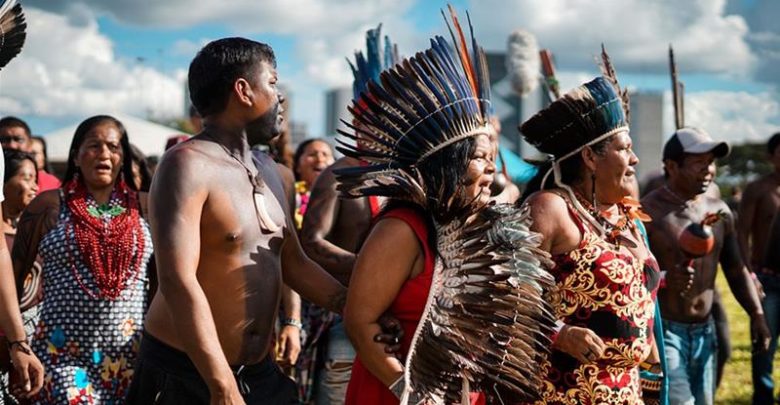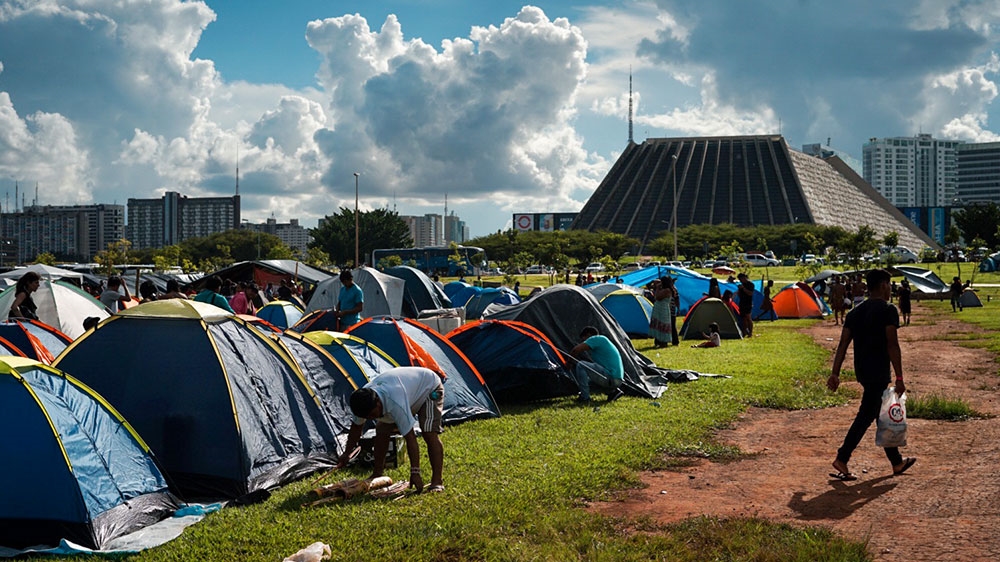
Thousands of indigenous people from across Brazil are gathering in the capital of Brasilia this week for the biggest indigenous protest in the country, the Free Land Camp.
More than 4,000 indigenous people from hundreds of tribes across the country are expected to camp out in front of government buildings for three days of native celebrations and protests against far-right President Jair Bolsonaro.
On Wednesday, indigenous communities began assembling hundreds of coloured tents just metres away from the National Congress.
“We have no way to fish, to [get] food, to bathe,” said Angoho Ha-ha-hae, the wife of the leader of the Pataxo tribe, whose water source was destroyed when a dam burst earlier this year. “We depend on the government, and where is it? We need help.”
The Articulation of the Indigenous People of Brazil (APIB), the main organisation behind the annual event, said this year’s protest is taking place in a “very grave context”.
“Since the government [of Bolsonaro] took office, several measures have been implemented that directly affect the rights of indigenous people,” says Luiz Eloy Terena, APIB’s legal counselor.
Terena told Al Jazeera some of these measures include the transfer of land demarcation and environmental licensing to the Ministry of Agriculture, and the extinction of the government offices responsible for the education and health of indigenous people.
“The president’s statements defending mineral exploration in our lands … and this idea that native people should be integrated and assimilated,” he said. “This year’s Free Land Camp is happening because of all of those things”.
Joenia Wapichana, the first indigenous congresswoman in Brazil, said during her short time in office that “the government is not open” to the indigenous struggle.
“The government is completely anti-indigenous,” she told Al Jazeera. “[Jair Bolsonaro] is only open to those who defend mining and land grabbing, which is his intention.”

APIB has documented a “series of attacks and invasions” of indigenous lands, as well as “persecution, racism and intolerance” shown toward native people since Bolsonaro took office at the beginning of the year. Several other indigenous organisations have also denounced land conflicts and a substantial increase in violence since January. Many believe the government’s relaxed stance on environmental issues is giving farmers and companies the green light to disrespect existing limitations, especially in the Amazon.
Bolsonaro has often said he is in favour of opening up the Amazon, the world’s largest forest, to foreign exploitation, especially by the United States. In a Facebook Live broadcast a week before the Free Land Camp, Bolsonaro said “the richness that exists [in the Amazon], should be explored rationally for the welbeing of our people and especially for the indigenous communities”.
The Brazilian president also accused several NGOs of “enslaving” the indigenous, and said that he wanted “to free them”.
“We want the best for the Brazilian indians, human beings like any others, but this ‘party’ is not going to continue in our government”, he said in the video.
‘We are not violent’
Just a days after Bolsonaro’s statement, Minister of Justice Sergio Moro approved the deployment of special-forces police for this week’s event at the government’s request. In a statement, Moro said the national forces will be acting to “secure the public order and the safety of people and patrimony … and the defence of the Union [building] and the Ministries square in Brasília”, where the National Congress and the Supreme Court are located.
In a statement sent to Al Jazeera, the Ministry of Justice said the National Public Security Force will be used “if necessary” to ensure the “safety of the patrimony of the Union (ministries) and its servers”.
Responding to Moro’s decision, APIB accused Bolsonaro’s government of wanting to “exterminate the indigenous peoples of Brazil” and not being available to “hear” and “help” them.
“Our camp has been happening peacefully for the past 15 years to give visibility to our daily struggles. (…) We are not violent, violence is attacking our sacred right to free protesting with armed forces,” the group said in a statement.

This week’s events will include a vigil in front of the Supreme Federal Court to demand more land demarcation. On Friday, the indigenous communities are expected to march towards the National Congress. In 2017, the march ended in clashes with police and an exchange of arrows and tear gas.
On Wednesday, Sonia Guajajara, the first woman to run for vice president in the country, told those at the event that “we will not surrender to unfair and fascist policies”.
“We are not only fighting for our constitutional rights but our right to exist,” she said.
SOURCE: AL JAZEERA NEWS
